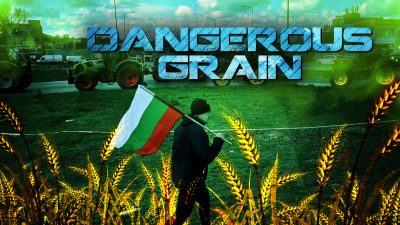Video: Dangerous Ukrainian Grain Flooding Europe

All Global Research articles can be read in 51 languages by activating the Translate Website button below the author’s name.
To receive Global Research’s Daily Newsletter (selected articles), click here.
Click the share button above to email/forward this article to your friends and colleagues. Follow us on Instagram and Twitter and subscribe to our Telegram Channel. Feel free to repost and share widely Global Research articles.
***
It seems that European countries are going to pay for their attempts to profit on cheap Ukrainian grain, which, instead of feeding the starving African countries, is being transferred to quite well-fed Europe. Ukrainian grain has already brought farmers in Eastern Europe to the brink of bankruptcy, it also turned out that it is dangerous for its consumers.
On April 13, the Slovak authorities banned the processing and sale of Ukrainian grain and flour made from it on the territory of the country. The Ministry of Agriculture and Regional Development of Slovakia stated that it found multiple excess of the maximum permissible concentration of pesticides.
In a 1.5 thousand tons batch of wheat from Ukraine, which was sent for threshing, “the presence of a pesticide that is not allowed in the EU and has a negative impact on human health was confirmed.” The Minister of Agriculture of Slovakia explained that three independent accredited laboratories confirmed the increased content of pesticide residues.
In the near future, the authorities intend to collect samples of all Ukrainian grain and flour stored in Slovakia.
The study in Slovakia confirmed the statements of the Polish Minister of Agriculture, who has already warned that Ukraine supplies grain of dubious quality to Europe.
On April 7, according to the head of the Ministry of Agriculture of Poland, Kiev agreed to stop importing grain into the country and now only its transit to other countries continues.
However, it did not help to avoid another scandal in the country.
The largest Polish newspaper Rzeczpospolita reported that the largest Polish flour mills received, under the guise of high-quality Polish grain, what was technical Ukrainian grain that had not passed food control and was intended for burning as fuel. Only grain that cannot be used for any other purposes is sent for burning. It is either infected with a fungus, or has become a poison due to improper storage. As a result of the dangerous deals, Polish flour mills lost more than 1.5 million zlotys.
In March, Romanian Agriculture Minister, citing an assessment by the European Commission, said that farmers from Poland, Romania, Hungary, Bulgaria and Slovakia had lost a total of €417 million due to the influx of cheap Ukrainian grain to the markets of those countries.
Poland and Romania reportedly asked the EU to create a mechanism to control cheap grain from Ukraine. In early April, Bulgaria, Hungary, Poland, Romania and Slovakia called on the European Commission to buy the accumulated Ukrainian food from them for “humanitarian reasons.” They complained that the prices of their own products is falling, and the prices of fertilizers and energy are rising.
The local authorities have agreed to “protect their farmers”. It is possible that the ongoing scandals may be a part of their struggle but the threat posed by the contaminated Ukrainian grain should not be belittled.
*
Note to readers: Please click the share button above. Follow us on Instagram and Twitter and subscribe to our Telegram Channel. Feel free to repost and share widely Global Research articles.
Featured image is from SF

